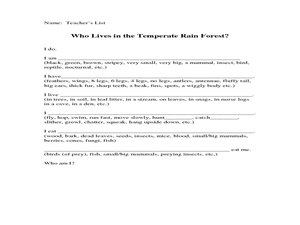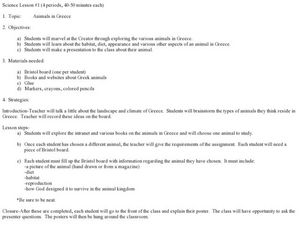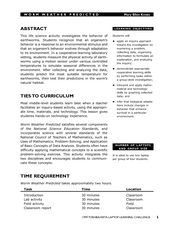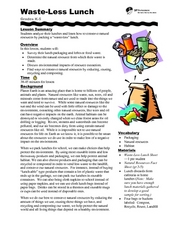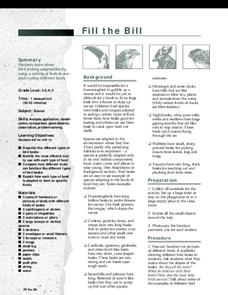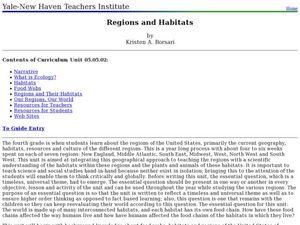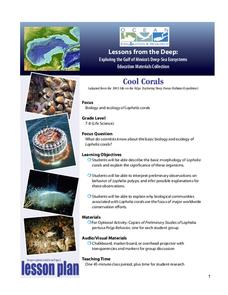Curated OER
Layers of the Forest
Students explore rain forests. In this rain forest ecosystems lesson, students identify and describe the layers of the rain forest. Students paint and decorate a large rain forest mural. Students write riddles about animals that live in...
Curated OER
Crustacean Critters
Young scholars explore the habitats of hermit crabs. In this crustacean lesson, students discover what animals need to survive. Working with live hermit crabs, young scholars explore how hermit crabs have adapted to their habitats.
Curated OER
Deserts: How Do You Define One?
Second graders identify what constitutes as a desert by reading a habitat checklist. In this environment lesson plan, 2nd graders read a nature website to discover facts about the desert and where they are located. Students utilize art...
Curated OER
Fish Fashion 101
Learners explore fish anatomy. In this fish anatomy and adaptation lesson, students define and identify the location of fish body parts. Learners add these parts of a fish's anatomy to a life-sized fish costume worn by a student. ...
Curated OER
Animals in Greece
This lesson is uncomplicated, consisting of a brief introduction to the Grecian landscape and climate, and then having individuals choose an animal in Greece to research. The youngsters display their information gathered on a poster. Be...
Curated OER
Worm Weather Predicted
Students examine worm habitats. In this animal habitats lesson, students participate in a lab activity that requires them to explore the adaptations that earthworms make to their environment.
Curated OER
What Do Koalas Need to Survive?
First graders take a field trip and examine the Koala and his habitat. In this Koala lesson, 1st graders read Possum Magic and discuss the foods of Australia. Students view the habitat of a Koala and record what it eats, its physical...
SF Environment
Waste-Less Lunch
Is it possible to have a waste-less lunch? Can your class become leaders in conservation? Discuss the importance of reducing waste during lunch time with a fun lesson that can be extended to everyday practices. First the class examines...
Curated OER
Earth's Heavenly Treasures: Hummingbirds
Young ornithologists watch an informative video and use the Internet to gather data about the life, size, habitat, and migration of hummingbirds. The interdisciplinary lesson includes activities that target art, science, math, and...
Channel Islands Film
Santa Cruz Island Restoration Narrative
What would you be willing to do to save an animal from extinction? After re-viewing a video about the restoration of the Island Fox on Santa Cruz Island, individuals adopt the point of view of one of the key players in the debate and...
National Wildlife Federation
Fill the Bill
The structure of a bird's beak lends itself to specific functions. Using an assortment of everyday objects, learners mimic the behaviors of bird beaks. They learn about the habits of different birds by studying their beaks.
Curated OER
Tropical Rainforests
Students create their own rainforest environment. This tropical rainforest lesson, introduces where rainforests are located, their real world connections, and their structural make up. It includes further resources online.
Curated OER
Regions and Habitats
Fourth graders identify the different habitats found in the seven regions of the United States. In this ecology lesson, 4th graders write an essay about how humans affect the ecosystem and vice versa. They discuss how changes on one...
Curated OER
TE Lesson: Habitat Mapping
Students examine the current technologies used in mapping resources in the marine environment. They look at remote sensing, sounding, and underwater vehicles. They examine image from the benthic habitat produced by the GIS in order to...
Curated OER
The Impacts of Human Activities on Biodiversity in New Haven County
Students discover how plants and animal ecosystems are affected by the growth of a city. In this ecology lesson, students study and observe a plant over a period of time. They develop a creative presentation of their data and share them...
Curated OER
Internet Scavenger Hunt
Students use a computer and the internet to click on highlighted words to find certain answers. They then write the answer to the questions on paper. Finally, students choose one animal to write about. They research the animal on the...
Curated OER
The Great Kapok Tree by Lynne Cherry
With The Great Kapok Tree, by Lynne Cherry as the hook learners discuss the rainforest, the animals that live there, and conservation efforts. Then, students write a letter to the man in the story asking him not to cut down the Kapok...
Curated OER
Home Sweet Home
Students explore marine turtle habitats. Students research one species of marine turtle found in the Gulf of Mexico. They identify plants and animals in the habitat. They create a model or replica using information gathered through their...
Curated OER
Animal Adaptations
Tenth graders participate in an arthropod scavenger hunt. In groups of two, they identify and collect two specimens of arthropods in the school area, and create a table of all the specimens and what class they belong to.
Curated OER
Writing Poetry About the Meadow
In this writing poetry about the meadow worksheet, students, after completing a lesson on meadow habitats, read the poem "Over in the Meadow" and then write additional stanzas using rhyming words and facts from the habitat lesson.
Curated OER
Animal Adaptation
Third graders read in their textbooks about how water affects habitats and discuss vocabulary and pictures from the lesson. Then in groups of two, they observe the teacher's example of a headline. They are then assigned to their own...
Curated OER
The Story that Tracks Tell
Eighth graders observe and investigate animal tracks. They draw prints for local animals and switch with another student to guess the animal, identify animal tracks in a nearby wood lot, create plaster casts of the tracks, and write a...
Curated OER
Technology Integration Lesson Plan: Internet
Seventh graders describe an endangered animal's environment and their habitat. They compare the habitat the animal came from vs. the one that exists today, in a Venn Diagram. Graphically, the student illustrates a proposed program to...
NOAA
Deep-Sea Ecosystems – Cool Corals
Young oceanographers research deep sea corals that thrive on chemosynthesis. The lesson focuses on the biology of the animal, preferred habitat, associations, and interactions.


